Facing our global crisis. Together.


Together, we are changing the way the world works to end animal cruelty and suffering. Forever.



Together, we are changing the way the world works to end animal cruelty and suffering. Forever.
Our global crisis
Three distressing images from 2022. A zebra lying dead in the parched Kenyan landscape – its once strong and vibrant body strangely deflated. An anteater gingerly picking its way through fire-devastated land in the Amazon. And a mother pig looking out from her small steel cage on a factory farm in Europe –hopelessness and suffering dulling her eyes.


Three animals – two wild, one farmed – separated by thousands of kilometres. Yet all are connected. The root of their suffering? The factory farming system so inherently cruel and so strongly linked with climate change that it is devastating our world. Demand for animal feed for factory farms is causing deforestation and loss of precious wild animals and their habitats at an extraordinary rate.
Ending factory farming will lead to a better, kinder world for wild animals – stopping the deforestation that drives them from their homes, injuring, killing and wiping out species. It will also protect water, soil and air, allowing wildlife to thrive.

Over the next decade, with your help, we are confident of great progress. That we’ll see millions of animals no longer suffering in industrial farms and a profound change in the way food is produced. This will in turn help to protect our environments, the wild places and spaces that animals live in, and create the healthy future we want for ourselves and our children.
Steve McIvor Chief executive officer Joanna Kerr Chair
Thank you for facing the global crisis with us. We can end it. Together.

47 million
We helped Kenyan poultry producer Kenchic develop a new animal welfare policy which will give 47 million chickens better lives.
61,285
61,285 supporters helped us urge travel giant TUI to stop selling tickets to venues that are causing great suffering to more than 400 captive dolphins worldwide.
30,000
More than 30,000 of you in the UK took actions to support our No Future for Factory Farming campaign.
20,000
More than 20,000 supporters helped us move the Australian government to update poultry standards and guidelines involving a battery cage phase out by 2036. This will change the lives of around 5.36 million egg-laying hens annually.
6,602
6,602 supporters worked with us to pressure the Thai government to redirect subsidies away from factory farming towards humane and sustainable practices.
1,200
More than 1,200 doctors in China signed up to support wildlife-free medicine. 193
We convinced the 193 members of the United Nations Environment Assembly to adopt a landmark resolution recognising the link between animal welfare, sustainable development and environmental protection.
62
We supported the care of 62 elephants in 10 venues around the world that were still recovering from tough Covid times.
60
When we asked governments attending COP27 in Sharm El Sheikh, Egypt to put a hold on factory farming, we had the additional backing of 60 key organisations based in Africa and Asia.
With our NGO partners we helped free 27 bears farmed for their bile in Vietnam, bringing the end to this cruel practice ever closer.
Their plight is urgent. And their future is inextricably linked with ours. Animals in the wild must be protected from the cruel exploitation and the unbearable suffering they endure. They must feel safe and secure, and free to thrive in abundant, natural habitats. Protecting their wellbeing will ultimately protect us all. With your help we worked tirelessly throughout the year to safeguard wild animals and change the way the world works.
Together we can end the cruel commercial exploitation of wild animals. Forever.
Touching trunks: Delhi and Gandhi meet for the first time at Elephant Haven, Europe’s first elephant sanctuary in France. Delhi joined Gandhi in August from a zoo in the Czech Republic where she had been living alone for four years. World Animal Protection supporters generously funded Delhi’s transport and a vet to care for her on the 30-hour drive.

Governments and businesses worldwide to accept that wild animals are born to be wild – not to be treated as commodities or exploited for profit. Policies and funding must focus on solutions to exploitation – protecting wild animals in their natural habitat so that they thrive unharmed.
Legal protection – international and national laws and enforcement that ensure wild animals and their habitats across the globe are safeguarded.
People to take action and hold wildlife exploiters and complicit governments to account and to recognise and reject industries and activities dependent on wildlife exploitation and habitat destruction. These include irresponsible tourist activities, wildlife-based traditional medicines, food, fashion and ornaments, and the trade in wild animals as pets.
Our new research released on World Lion Day (10 August) galvanised some of the world’s largest travel companies to press the South African government to publicly commit to end trophy hunting. Companies including Booking.com, Expedia Group and TripAdvisor issued a joint statement against this unacceptable cruelty which results in hundreds of lions being slaughtered by tourist hunters annually. Many will have been captive bred in horrific conditions for the blood sport.

The research includes responses from 10,900 people, including international tourists from countries with the most frequent visitors to South Africa and South African citizens. It revealed universally strong opposition to trophy hunting. Eighty four percent of international tourists agreed that the government should prioritise wildlife-friendly tourism over trophy hunting. And 70% of South African citizens agreed their country would be a more attractive tourist destination if they banned trophy hunting
We conducted the research in response to the South African government’s proposed changes to policies on conservation and sustainable use of the country’s biodiversity.
We also mobilised more than 25,000 supporters through #CancelCaptivity to demand that South Africa’s government produce their long-promised plan to shut down the commercial captive lion breeding industry. This action was launched with Blood Lions, our partner on this issue since 2019. Between 8,000–12,000 lions are held in captivity; they are cruelly bred for hunting and tourist interactions like cub petting, and for wildlife-based traditional medicine. There is a risk that the government may bow to industry pressure, watering down its commitment to a voluntary phase out and this is clearly not acceptable.
“South Africa is one of the most popular. tourist destinations and home to so many iconic species. This makes it well placed to set an example to the rest of world through responsible tourism practices and to relegate trophy hunting to the past,”
Edith Kabesiime, wildlife campaign manager (Africa)© World Animal Protection / Aaron Gekoski
Wild animals worldwide will benefit from our new collaboration with Scandinavia’s largest travel company, Spies Travel (Nordic Leisure Travel Group). Through the collaboration, Spies will ensure animal welfare is at the forefront of all their 400+ destinations around the globe. All wild animal experiences offered by Spies and their sister companies Globetrotter, Ving Rejser and Tjaereborg will focus on animals in their natural environment and animal welfare. Excursions to entertainments like dolphin shows or rides on elephants will not be offered.
Spies’ travellers will also be advised against participating in other cruel activities they might encounter during their trip. These could include petting lions and tigers, taking selfies with wildlife, or paying to see dancing monkeys and bears.

“Spies’ decision, as the Nordic region’s largest travel group, to work with us is truly world-moving,” says Stephanie Kruuse Klausen, campaign manager at World Animal Protection Denmark. “It will undoubtedly have a positive effect on both animals, people, and nature in the farthest corners of the globe.”
“It’s truly exciting to collaborate with World Animal Protection. Together we are dedicated to changing the systems that allow wild animals to be abused for tourism.
Through our partnership we will guide our guests to animal-friendly and responsible wildlife experiences at our many destinations. We are looking forward to developing new and exciting wildlifefriendly experiences in the future – leading the way for Scandinavian travellers.”
Sofie Folden Lund Head of communications and press, Spies Travel

The suffering of more than 400 dolphins in at least 25 venues promoted by travel giant TUI was powerfully highlighted by our ‘honest rebrand’ video of a UK TUI store. The film featured the award-winning writer and performer Jolyon Rubenstein exposing the unhappy holiday horrors behind dolphin entertainment. Widely shared on social media during October, it reached more than 550,000 people.
We urged the company to stop ticket sales to such venues through online campaigns and a petition that achieved more than 60,000 signatures. Of those people, 3,800 emailed the TUI CEO asking him to stop selling captive dolphin experiences.
Travel companies including Expedia Group, Virgin Holidays, TripAdvisor, British Airways Holidays and Booking.com have already shown leadership and cut ties with the cruel captive dolphin industry. We will continue to target TUI in 2023 and launch campaigns targeting the world’s largest travel company laggards that continue to profit from wildlife entertainment.

YouTube removed two channels showing physical and mental cruelty inflicted on wild animal ‘pets’, thanks to our work with the Social Media Animal Cruelty Coalition (SMACC). The Coalition’s report, launched in November, highlighted videos of wild animal species kept as pets, cruelly treated and filmed simply to get likes and comments on social media.
Films included bush babies dressed in baby clothes, lions and tigers dragged around on leads and monkeys fed bottles of milk. Some species, including orangutans and chimpanzees, were endangered. Eight hundred and forty individual links to videos from Facebook, YouTube, TikTok, Twitter and Instagram were documented. Although YouTube has responded, these other platforms have not. We will continue to put pressure on YouTube to prevent such content from being uploaded in the first place.

Australia’s Dreamworld will stop offering visitors circus-style tiger entertainments and direct contact activities, such as hand bottle feeding these iconic animals, within 18 months. Their decision was prompted by our ‘Too close for comfort’ report launched in July 2022 detailing how some Australian wildlife venues exploit wildlife for profit through forced visitor interactions. Report researchers documented how koalas, tigers and dolphins are the most exploited. They identified Queensland as a hotspot for this type of cruelty.
Devastating deals: Chicago-based street artist Blake Jones collaborated with us to highlight Groupon’s partnerships with some of the cruelest captive wildlife venues in the USA. Our research revealed Groupon profiting from marine amusement parks, so-called ‘sanctuaries’ and roadside zoos. We urged consumers to steer clear of them and Groupon to drop the deals.
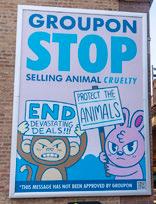
With our supporters, we’ve dedicated 30 years to stopping the suffering of the world’s bears. Together, we’ve helped end cruel entertainments – like bear dancing in some countries – supported sanctuaries and campaigned hard to protect bears from the wildlife-based traditional medicine trade. Here are just some of the things we achieved in 2022.
Farmed misery: Nine bears were rescued from three separate bear bile farms in Binh Duong province, Vietnam during February in the largest bear rescue ever supported by World Animal Protection. The bears had been kept in tiny cages for more than 17 years; they were very small, thin and weak.

During 2022 we rescued 27 bile bears from farms with the support of the Vietnam government and our NGO partners. All are now living safe from harm in NGO sanctuaries and government rescue centres.
Bear bile farming in Vietnam subjects bears to unimaginable suffering. They live out their lives in tiny narrow cages waiting to supply the wildlife-based traditional medicine trade. Thankfully, through our partnership with Education for Nature –Vietnam (ENV) which started in 2005, the number of bears farmed for their bile, has dropped from 4,300 to 257.
We also targeted local authorities in the Hanoi region –Vietnam’s largest bear bile hotspot – and persuaded them to ramp up wildlife protection and tackle illegal bear bile farming. Hanoi holds 140 bears, or 54% of captive bears in Vietnam.
Throughout the year, we supported our partner the Bioresource Research Centre of Pakistan (BRC) to care for 75 former baited and dancing bears at the Balkasar bear sanctuary in Punjab Province. Three were rescued during the year – surrendered to BRC by their owners in exchange for alternative livelihoods and a pledge to never own bears and earn money from them again. In total, since 2008, 111 owners have handed over their bears and taken up alternative livelihoods. These include 31 who are operating as goods transporters and 68 who own shops.
War rescue: Bolik wanders happily at the Romanian bear sanctuary which we have supported since 2005. The 15-year-old bear was rescued through a complex mission in April, involving World Animal Protection and partners, from a bombed Ukraine tourist resort.

We protect wild animals from the wildlife-based traditional medicine trade by ending the demand for their use as ingredients. Hundreds of thousands, if not millions, of wild animals ranging from sea horses and pangolins to lions, tigers and bears are likely to be killed for the trade annually.

During 2022 we…
Moved 1,237 doctors and practitioners in China and five Chinese pharmaceutical companies to sign our wildlifefriendly medicine pledge. This brings the total number of doctors and companies who have committed to not using wild animal ingredients to 2,423 and 13 respectively.
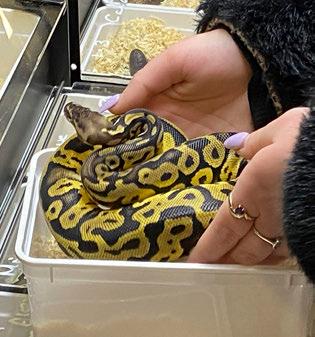
Welcomed the endorsement of our website tawap.org – which showcases plant and mineral-based alternatives – by three wildlife-based traditional medicine associations in the USA and Canada. These associations represent thousands of practitioners.


Thanks to the action of World Animal Protection supporters, thousands of reptiles will not be sold at Doncaster Reptile Market in the UK. Since 2020 we have campaigned against this cruel event, held at the city’s racecourse, and galvanised tens of thousands of people to call for its end.
In April we asked our supporters to put the pressure on again. Within just 24 hours, 4,809 people emailed the Mayor of Doncaster, asking the local authority to stop the market taking place. This resulted in the racecourse not renewing the market’s contract. Doncaster Reptile Market has been held at the racecourse for more than 10 years and was a large sales event for ball python breeders. It regularly attracted as many as 5,000 people.
Millions of wild animals are cruelly farmed or captured, and slaughtered annually for their fur, skins and feathers to fuel fashion industry demands. To tackle their plight, we urged Fashion Week organisers in Copenhagen, Melbourne, and Sydney to ban the use of these suffering-based products from their shows.
Joint action with our partners, Collective Fashion and Four Paws, resulted in Melbourne Fashion Week banning skins from exotic animals and fur, while Copenhagen banned fur. Sydney Fashion Week did not introduce a complete ban in 2022, despite seven months of lobbying and pressure from our supporters. However, AfterPay and the City of Sydney – the key sponsors – have agreed to continue working with us to ensure 2023’s fashion show protects wild animals.

• Moving Viking, the famous Dutch ice skate brand and Olympic athlete supplier, to stop using kangaroo leather for their skates. Millions of kangaroos are culled annually in Australia to supply the trade for meat and leather.
• Convincing Gucci owners – the Kerring Luxury Group – to rethink the use of wild animals in their advertising and marketing campaigns across all their brands. They have agreed to work with us and other partners to develop standards to protect wildlife.
Relentless demand for cheap, low welfare meat on supermarket shelves has created a brutal chain of cruelty that is killing our world. Lush savannah and rainforests in Brazil are deliberately reduced to scorched earth to clear land and grow animal feed crops for meatproducing giants like JBS.
Consequently, wild animals are suffering and dying in their millions. Meanwhile, billions of farmed animals live a tortured existence on factory farms, eating the soy and grain grown on these desecrated habitats.
With your help we are tackling industrial farming – a root cause of wild and farmed animal suffering –and supporting emergency action in Brazil for fire-affected animals.

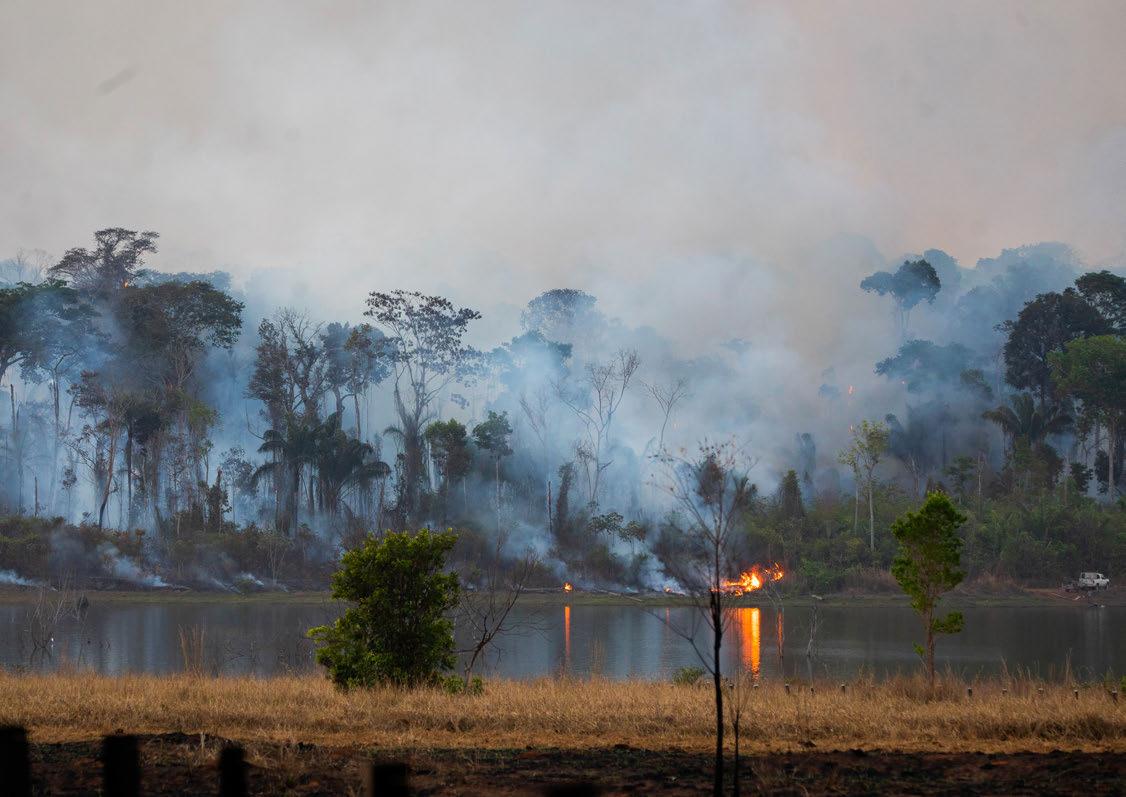
JBS, the world’s biggest meat processing company, depends on the flow of cheap animal feed to fuel its business. Our investigations, released in the lead-up to the UN’s climate conference (COP27) in November, firmly linked its feed sources to suppliers who have carried out illegal deforestation. We are calling on JBS to stop profiting from soy and grain products grown on lands that should be wildlife habitats. We want them to commit to ending deforestation in animal feed sourcing.
© Noelly Castro / World Animal Protection © Noelly Castro / World Animal ProtectionCecília, a giant anteater pup, orphaned by the forest fires in the Pantanal, became the first winner of our Wild Animal Unique Personality Award. The award was set up to honour much-loved World Animal Protection employee Audrey Mealia. It attracted thousands of votes from people worldwide captivated by the stories and video footage of Cecília and four other nominees.

The baby anteater was around six months old when she was brought to Orphans of the Fire in August 2021. This life-saving facility, run by our partner Institutió Tamanduá, rehabilitates and returns orphaned anteaters to the wild. Cecília is expected to make her wild return in early 2023. Her US$10,000 prize is a grant to Institutió Tamanduá to help improve its facilities.
Through Instituto Ecótono, a local environment protection NGO, we supported the care of wild animals in Matto Grosso State in 2022. Meet two of them – Xamá, a jaguar cub, and Baby, a collared peccary…

Trauma recovery: Xamá was found alone, weak and dehydrated, near a hydroelectric power plant in August. Thanks to the Federal University of Mato Grosso’s veterinary hospital (UFMT) in Sinop, that works with Instituto Ecótono, he is growing well. To help with Xama’s eventual wild release, we established a successful partnership with Onçafari, an NGO that specialises in jaguar rehabilitation. He’ll move to their facilities in January 2023.
Safe haven: Baby, a collared peccary, arrived at UFMT in Sinop in August. She was found on a road with her dead mother who had been run over while fleeing the fires. By the end of the year, Baby was feeding well, gaining weight, and enjoying playing outside – all good signs for her eventual return to the wild.
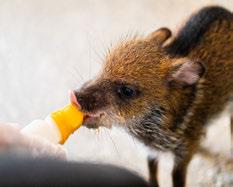
With our supporters we are…
Funding work in emergency zones, rescuing and caring for animals affected by fires and habitat loss, meeting their survival needs and moving them to safety.

Building a movement to oppose cruel factory farming by educating the public to show how companies like JBS are profiting from habitat loss.
Exposing the practices of companies involved in deforestation for farming. Moving governments and businesses to stop the expansion of factory farming and fight for new legal protection of existing habitats.
Factory farming is killing our planet. It is to blame for the destruction of vital habitats, the displacement of wildlife, climate change and is the largest cause of animal suffering globally. Within this broken and greedy system, nearly 80 billion land-based animals are farmed annually, mostly on factory farms. They are deprived of any quality of life and suffer their entire lives. Many never see sunlight, roam freely in a field, or even have a life free of pain. This is cruelty at its very worst and it must end.
To end farmed animal suffering we want…
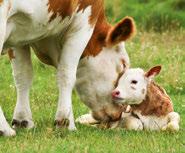
Governments to put a ban on building new factory farms instead of using their power to subsidise these cruel and planetkilling systems. Government policy and funding must shift to support humane and sustainable food systems.

The factory farming industry to switch to humane and sustainable food systems that are kinder to animals, people and the planet. They can start to achieve this goal by implementing farmed animal responsible minimum standards,* halving the number of animals farmed by 2040 and phasing out monocrops like soya as feed.
*See site: farms-initiative.com
People choosing to eat less meat. By consuming fewer animal products and ensuring that those we do eat are higher welfare, we can all help end farmed animal suffering and save our world.

We exposed how factory farming is putting the Paris Climate Agreement targets at risk in our report, ‘Climate change and cruelty’. We used this powerful publication to call for change at COP27 and the G20 meetings in November. It grabbed media headlines worldwide reaching more than 180 million people
Pork and chicken are often overlooked as contributors to climate change, yet 69 billion meat chickens and 1.5 billion pigs are killed and consumed annually –mostly in factory farms.
Our researchers examined pork and chicken factory farming in hotspot countries: Brazil, China, Netherlands and the USA. They calculated that emissions from chicken meat production in these countries alone are equivalent to keeping 29 million cars on the road for a year.
‘Climate change and cruelty’ also spells out a clear pathway to tackle the climate crisis, including a solution to halve the carbon emissions of chicken and pork production in factory farming hotspots.
To achieve this target, people in these areas should reduce meat consumption by 50% by 2040 and only consume higher welfare meat where available.
million metric tons of greenhouse gas emissions
‘Climate change and cruelty’ findings were further supported by our economic and environmental modelling research in Canada. It revealed that Canada could meet its climate targets if residents switched to low-meat diets – reducing consumption by 50% by 2030 and 80% by 2050.
The average Canadian eats 70kg of meat a year – twice the global average.
135 million metric tons of
10.2 million in China
347
greenhouse gas emissions that is the equivalent of
IN FOUR COUNTRIES
44.4 million in China
9.9 million in the USA
10.3 million in the USA
5.2 million in the Netherlands
16.6 million in the Netherlands
3.8 million in Brazil
3.4 million in Brazil
= 1 million cars
Hosted the first ever Food4Climate side event with 20 other civil society organisations and called on governments to stop approving new factory farms.
Embraced the first ever Agriculture Day at a COP. This put food systems firmly on the radar of the world leaders charged with saving our planet.
First-hand accounts of elephants and zebras dying in a drought-stricken Kenyan landscape, and of African farmers desperately seeking water for their animals from nearly empty water holes…

Pressed for a moratorium on factory farming.

Collaborated with civil society allies in Africa and Asia on support for climate-safe humane and sustainable food and protein production instead.
Highlighted the disparity that Africa, despite its low contribution to greenhouse gas emissions and low levels of factory farming, is the most vulnerable continent to climate change.
Despite the clear emergency and evidence presented, COP27 only agreed to small steps forward.
These included:
• Recognition from the meeting that agriculture and food systems will be included in future COP discussions, but no guarantee of their rightful place near the top of the agenda.
• Fifty more countries signing the Global Methane Pledge to reduce emissions, bringing the number to 150. However, the pledge doesn’t specifically cover livestock farming.

Exposing the links between meat-producing giant JBS and rainforest destruction for animal feed production…
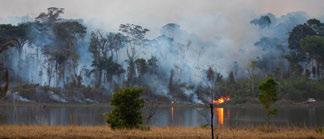
These are just some of the powerful stories and challenges we took to COP27 at Sharm El Sheikh in November. The conference was attended by more than 100 heads of state, nearly 200 governments and over 35,000 participants.
Our expert advocates urged them to understand the inextricable connections between factory farming’s huge carbon footprint and the climate change crisis devastating our world. They made it clear that even if fossil fuel emissions were eliminated immediately, emissions from the global food system alone would make it impossible to limit warming to 1.5°C.

We called out factory farming as the hidden culprit in climate change during Climate Week in New York in September which also coincided with UN General Assembly meetings. We confronted thousands of policymakers and advocates from around the world with our powerful ‘What we eat is causing this heat’ visual projections, mobile billboards and posters.

Our message was also supported by videos on our TikTok and YouTube channels and highlighted the connection between everyday factory farmed meat-based fast foods and climate change. Content featured a QR code giving people further information and enabling them to sign up to our Meating Halfway meat reduction journey. People were also urged to ask their legislators to support the Farm System Reform Act. If passed, the Act would phase out the largest factory farms in the USA by 2040.
Imagine hundreds of thousands of pigs packed together – bred and farmed for their meat in clinical, multistorey buildings –as many as 26 floors high – in towns and cities…
People world-wide are joining our call to protect animals by eating more plant-based foods and are encouraging others to do the same. Here are just some of the ways we inspired change in 2022. We…
Launched the Plant Protein Challenge in Aotearoa, New Zealand and the Plan Meatless Better campaign in Canada. More than 500 participants were guided in their meat-free journey with advice, tasty recipes and expert support.
And through our ‘Protein switch’ report in Australia, we ranked fast food restaurants on their plant-based offerings, and their commitment to meat chicken welfare. KFC Australia received the lowest ranking. Our petition, launched in October calling for KFC improvements achieved more than 7,000 signatures by the year’s end.
This is not science fiction but already a grim reality for some pigs in China.
Mobilised celebrity support. Maria Poonlertlarp, Miss Universe 2017 and World Animal Protection ambassador, joined thousands of people at our ‘Happy Meat, Happy Me’ event at Samyan Mitrtown mall in Bangkok in October.
Hosted eight animal-friendly influencers in The Netherlands at Kerstdiernee – our plant-based Christmas dinner. Videos of the meal posted on social media were seen more than 210,000 times. We also promoted ethical and sustainable eating through our gastronomic event held with 10 prestigious restaurants in São Paulo, Brazil in June.
Galvanised 18,880 people in the USA to email the executives of fast-food chain Popeyes and Restaurant Brands International –the company’s owner – to add a plant-based menu item. We also persuaded restaurant chains International House of Pancakes (IHOP) and Jack in the Box to run a plant-based meal trial.
We exposed the intense animal cruelty and risks to people and the environment in a new report, commissioned from PWC experts, into the issue. Following our investigation, we launched a virtual event attended by 7,000 participants including leading pig producers. We urged them to rethink investments in multistorey farms and move to a more sustainable food system.

Our Fairer Finance campaign exposes how financial institutions, governments and businesses hide their support of factory farming and their links to rainforest devastation. During 2022 our pressure with Stop Financing Factory Farming Campaign partners resulted in the Inter-American Development Bank dropping its approval of a US$43m loan to Marfrig, a Brazilian beef company.
Over the last 10 years, the top five development banks poured US$4.5bn into industrial livestock companies under the guise of sustainable development.
Other steps forward included...
Assessing Brazilian banks regarding animal welfare and their investment and credit policies for the first time in the Fair Finance Guide Brazil (9th edition). The Guide helps consumers evaluate the investments their banks are making and where their savings are going. Shockingly, all banks scored a zero rating on animal welfare. The guides are released with our partners the Brazilian Institute of Consumer Protection, Conectas Human Rights and Sou da Paz Institute.
Mobilising 15,000 supporters via an SMS campaign to convince Dutch finance company ABP to include animal welfare in their investment policies. Our exposé revealed its US$8bn financial support of companies involved in factory farming. We also persuaded two commercial Swedish banks Swedbank and Lansforsakringar to publish and publicly announce their very first animal welfare policy.
We also joined our partners at the World Bank meetings in Washington, DC to campaign against development bank financing of factory farming. More than 10 million people saw our online posts, priming them for our forthcoming campaign to persuade the International Finance Corporation – part of the World Bank Group –to not fund factory farms.
Our 2022 report ‘Closing the finance gap’ formed the backbone of our campaign.
Convincing Australian pension funds – CareSuper, Rest Super and HESTA to stop investing in industries involved in live animal export under their sustainable funds investment options.


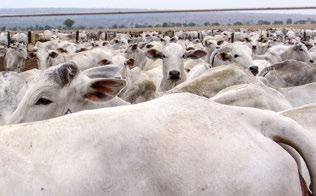
Factory farms use up to 75% of the world’s antibiotics to prevent sickness among farmed animals forced to live in their thousands in highly stressful, cruel and squalid unnatural conditions. Such overuse, condemned by the World Health Organization, contributes to the superbug crisis – antibiotic resistant infections – which now kill more than 1.27 million people annually.
Since 2018 our pioneering research has identified superbugs in meat from factory farmed animals, and superbugs and antibiotic resistant genes in water around factory farms.
• Presented our report ‘Life-threatening superbugs: how factory farm pollution risks human health’ to the UK government in November. The government had called for evidence to develop the UK’s antimicrobial resistance (AMR) national action plan. We are pressing for the plan to ban the use of antibiotics to compensate for cruel conditions.
• Captured the attention of more than 7.3 million people in Brazil by raising awareness of the superbug crisis through subway station advertisements. We also launched our documentary, ‘Multi-resistant bacteria: An invisible threat’, at cinemas in June.
• Worked to ensure that antimicrobial resistance was included in the drafting of Canada’s pandemic prevention and preparedness bill. It is expected to go to Parliament in early 2023.
• Received an US$85,000 grant from the Oak Foundation, hosted by Swiss Philanthropy Foundation. This generous funding will support further research into antimicrobial resistance, its links with intensive animal farming, and the impacts on the environment and public health in India and Thailand.
Our long-term relationship with Kenchic, East and Central Africa’s leading poultry producer, resulted in major steps forward during 2022 to protect animals, people and the planet. The company has introduced policies to give its chickens better lives. Its animal welfare policy includes keeping fewer chicken in one area, and choosing slower growing chicken breeds, which will greatly reduce the suffering intensively farmed animals endure.
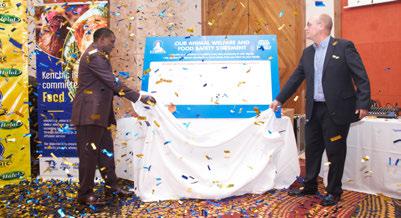
Kenchic also committed to never using cages, responsible antibiotic use and to ensure sustainable practices, including those relating to farming waste and emissions. All improvements will be introduced by 2030.
1.27 million people killed by antibiotic resistant infections
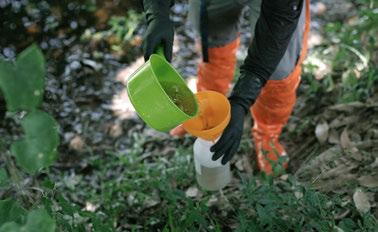
• Met with high level members of government, MPs and chief veterinary officers after finding antibiotic-resistant bacteria in Australian supermarket beef and salmon samples. Our report with Centre to Impact AMR gained significant media coverage and raised awareness of AMR risks in industrial farming. It also empowered grassroot communities to call on governments to address AMR and improve animal welfare standards.
“We are proud that the adoption of animal welfare, food safety and antimicrobial policies has set us apart from other players in the industry. This makes us the leading producer in safe, healthy, and sustainable animal farming practices in the region. There is a need for appropriate prudent use of all antimicrobials, including those used in food animals. We would like to acknowledge World Animal Protection’s work in the industry as a catalyst in setting standardised regulations that level the playing field,” said Jim Tozer, managing director of Kenchic Ltd.
Our high-level advocacy work led to first-time recognition from the United Nations Environment Assembly that animal welfare and the environment are inextricably linked and at the heart of sustainable development. UNEA adopted the ‘Animal Welfare – Environment – Sustainable Development Nexus’ resolution at their meeting in Kenya in March.
And in the UK, after intense pressure from our supporters and partner organisations, the Animal Welfare (Sentience) Bill finally became law in April. This landmark piece of legislation will recognise the sentience of all vertebrate animals, decapod crustaceans and cephalopods. It will also promote the legal protection of animals when new UK laws and policies are made.

“This bold step should provoke other policy bodies to recognise the sentience of animals as it is inextricably linked to protection of the environment and promotion of people’s livelihoods,” said Tennyson Williams, World Animal Protection country director for Africa.
We’ll…
• Build global, people-powered campaign momentum to disrupt and secure commitments from key outstanding travel industry laggards still profiting from cruel wildlife entertainment. Three hundred companies have already made these changes; commitments from Tui.com, Trip.com and Groupon, will further make the cruel wildlife industry commercially non-viable.
• Launch our new Wildlife Not Profit campaign to make this the last generation of wild animals to suffer from cruel commercial exploitation. In 2023, we’ll push for bear, elephant and lion farming and breeding bans in China, Thailand and South Africa. We will also continue to build our case and evidence for a new agenda that protects wild animals’ right to a wild life.


• Innovate new solutions for wild animals. These will include building a pro-plant alliance to secure the end of wild animal use in wildlife-based traditional medicine, and a ‘Wildlife Heritage Areas Network’. This will bring wildlifefriendly solutions to the travel industry. We’ll also develop a ‘Frontline Community Protectors Network’. It will develop new approaches in Peru, India and South Africa, making local communities central to wild animal and habitat protection.

Stop wild animals being cruelly exploited as commodities by changing the systems that allow it.


We’ll…
• Focus our bold people-powered campaigning on the world’s biggest meat processor, JBS. With our campaigners we’ll call for an end to the company’s link with habitat destruction through their animal feed sourcing, and expose the climatedestroying nature of their business. We’ll also raise public concern by shining a stark light on the harms imposed on the world by the global factory farming industry. And, through our work with civil society groups, we’ll create a united peoplepowered political push for a moratorium on factory farming. The UN’s climate conference for governments (COP28) will be a key rallying moment.
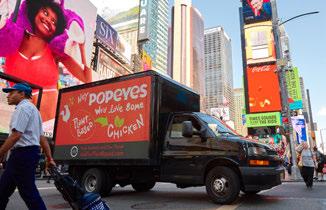
We’ll…
• Mobilise people to secure commitments for higher welfare in farmed animal systems from 10 companies with the power to influence the whole industry. And we’ll continue our work to give high meat consuming countries and companies a clear path to meat reduction. We’ll also develop and present our global solutions and compelling arguments, fostering reduced meat consumption and humane and sustainable protein consumption. In doing so we’ll turn the world away from factory farming.
We’ll…
• Continue campaigning against the development banks who continue to fund new cruel factory farms. Our research will document the problems these projects cause, and rank, name and shame the worst banking offenders. We’ll also continue to push commercial banks and pension funds to improve animal welfare by moving their investment and lending capital away from harmful animal industries. Our public campaigns and one-to-one dialogue with financial institutions will focus on the importance of a protein transition and humane and sustainable farming in saving our world.
“We’ll step up our efforts in raising the visibility of factory farming as a climate culprit in the lead up and press governments for a moratorium on factory farming. We’ll also call for a predominantly plant-based food system, supported by clear food systems policies and targets, and a diversified livestock farming sector with fewer animals produced.
Transforming the global food system and ending factory farming means that we can protect precious habitats and prevent billions more animals from being born into a life of cruelty and pain.”
Kelly DentThank you to our worldwide family of individual donors, trusts, foundations, corporations, and governments for your generous support of our mission.
To our World Animal Guardians, On behalf of all the animals whose lives will be transformed by your incredible generosity, we extend our deepest gratitude to you for choosing to leave a future gift to World Animal Protection in your Will.
Your compassionate act will have a lasting impact on the welfare and protection of animals around the globe.
Investing in Others is a grant programme that we execute in collaboration with our strategic philanthropic partner, Open Philanthropy.
There is a growing interest in farmed animal welfare in Southeast Asia, so together we are awarding small-scale grants to grassroots organisations across the region. These will increase their capacity and potential to transform the global food system and the lives of billions of animals.
In 2022, we awarded up to US$80,000 for a two-year grant to eight organisations in Thailand, the Philippines, Bali, Vietnam, and Indonesia. These projects focus on a range of issues including policy change to benefit farmed animals, corporate engagement, public mobilisation, communications, research, and transitioning to plant-based diets and meat reduction. Our organisation supports the grantees by providing grant management support and developing their technical capacity to improve the lives of farmed animals.
If you would like more information on how to leave a gift in your will, please visit our website or contact Tiffany Oliveira by phone: 1 800 363 9772 or email mylegacy@worldanimalprotection.ca.
You can also start your Will for free today thanks to our partnership with Willfora. Click here to get started.
Stepping out: Paddington enjoys a wintry walk at the Romanian bear sanctuary run by our partner Asociatia Milioane de Prieteni (AMP). He was brought to the sanctuary as a young orphaned bear seven years ago after being found roaming the streets of Sibiu, a large city in Transylvania. The AMP team believes he had most likely been kept as a pet and then abandoned. Sadly, he had not developed skills to fend for himself in the wild.
US$80,000 in grants awarded to eight organisations


Thank you for your continued support in 2022. Your generosity played a pivotal role in advancing the mission of animal welfare and protection on a global scale.
The Global Review highlights successful campaigns and projects that have raised public awareness, influenced policy changes and promoted responsible practices across various industries. It highlights the incredible achievements made through collaborations and partnerships with governments, NGOs (non-governmental organizations), corporations and individuals, like you.
Our collective impact is a testament to the power of collaboration and shared values.
Advocating for new Canadian legislation. Thanks to your support, we are preventing future exploitation of wildlife in Canada. Our team provided research and advice for new legislation known as Bill S-241 - the Jane Goodall Act. Across all levels of government, we have been advocating for decades for changes to the zoo and exotic animal regulations. Additionally, we provided foundational input into Bill C-293, also known as the Pandemic Prevention and Preparedness Act, by highlighting the importance of a One Health perspective and addressing top pandemic drivers like the commercial wildlife trade and factory farming.
Exposing the cruelty of roadside zoos across Ontario. In 2022, we investigated a selection of roadside zoos and summarized our findings in a new report, ‘Nothing New at the Zoo’. We found that many of these zoos provide inadequate space, keep social animals in barren or isolated conditions and ignore potential safety issues.
We have submitted official complaints and have shared our findings with the Ministry of the Solicitor General. We are advocating for a mandatory provincial zoo licensing system to better protect wild animals and communities.
Making history. World Animal Protection joined nearly 20,000 delegates from more than 190 countries to discuss the biodiversity crisis at COP15, the UN’s Conference on Biological Diversity, in December 2022.
We were one of a small number of participants selected to hold a side-event in the Canadian Pavilion. Our event included a panel presentation with representatives from government, First Nations and other stakeholders in the mission to secure greater protections for animals and their habitats.
Our team also attended COP27 in November 2022 where we advocated for agriculture’s inclusion in the climate crisis talks.
Discovering new evidence. Thanks to your support, our team produced the first research in Canada showing how eating less meat and dairy can reduce greenhouse gas (GHG) emissions and allow Canada to bridge its Paris “emissions gap”.

This research is valuable evidence to help us persuade the federal government to understand the advantages of changing our food system. By making this change, we can have a food system that is better for the environment and kinder to animals.
The figures included in our Global Review represent the figures of World Animal Protection Canada. An external audit was completed in March of 2023. To review our annual audited financial statements please visit our website under "Annual report and financials".
You will note that we ended 2022 with a deficit. Over the course of the year, additional programs and initiatives were approved by the Board with the plan to draw on reserves we have acquired over the years. We believed these expenditures were important and necessary to continue our work in improving the plight of animals around the world. Ultimately, the reported deficit was larger than planned due to market investment fluctuations and the accompanying unrealized losses resulting from it.
Colin Saravanamuttoo Executive Director, Canada

Wild life: An orca living freely in the Whale Heritage Site of Algoa Bay, South Africa. Throughout the year we continued scoping wildlife-friendly alternatives for the travel industry by developing the Whale Heritage Sites project run by the World Cetacean Alliance (WCA). In 2022 five new candidate sites were put forward for accreditation. They are located in Santa Catarina and Salvador, Brazil; Plettenberg Bay, South Africa; Madeira, Portugal, and South San Jorge Gulf, Argentina. When accredited they will join three other Whale Heritage Sites in Spain, South Africa and California, USA.
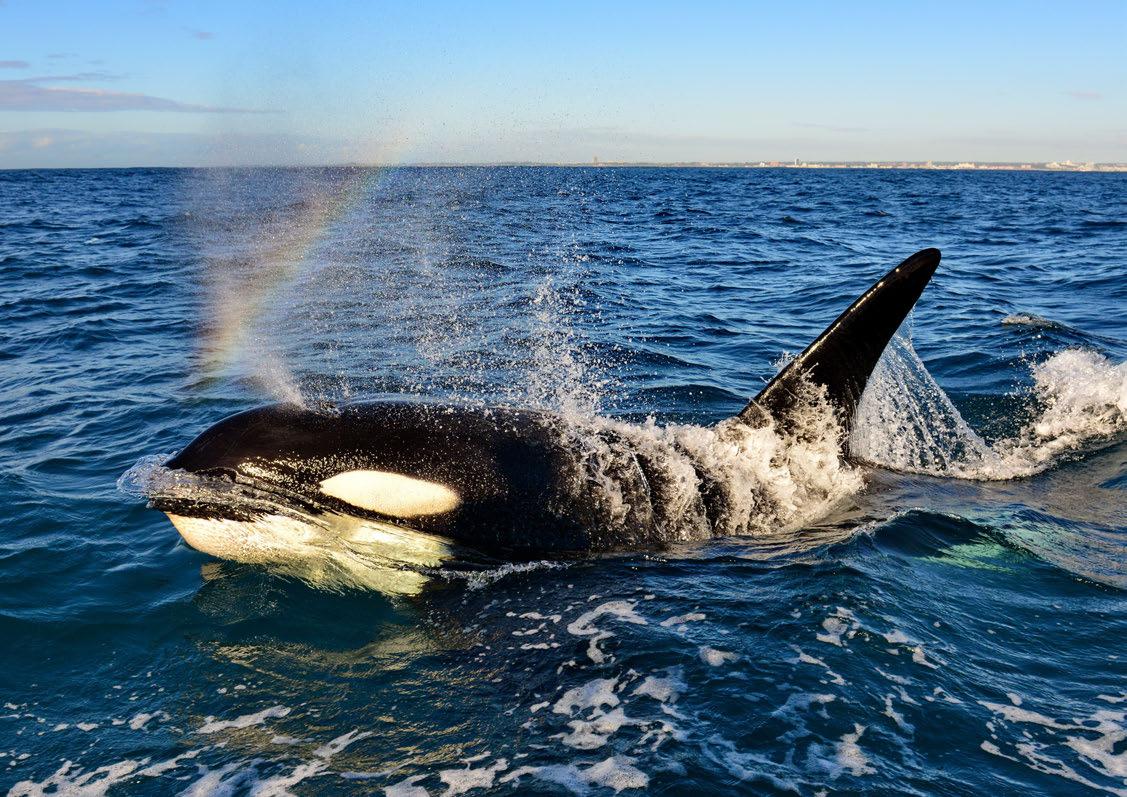 © Lloyd Edwards / Raggy Charters
© Lloyd Edwards / Raggy Charters